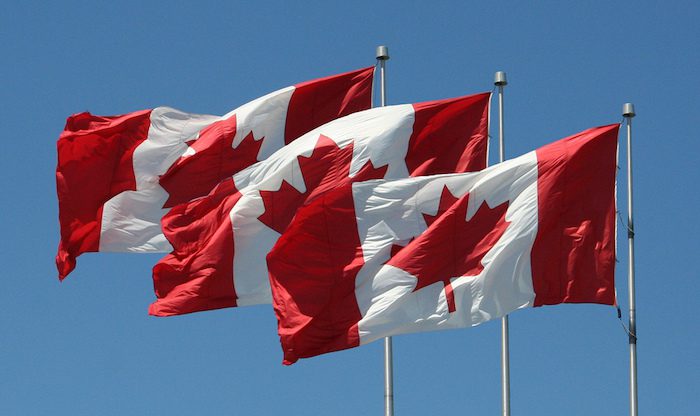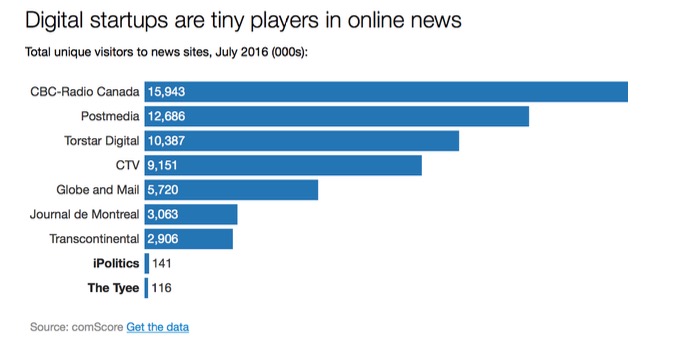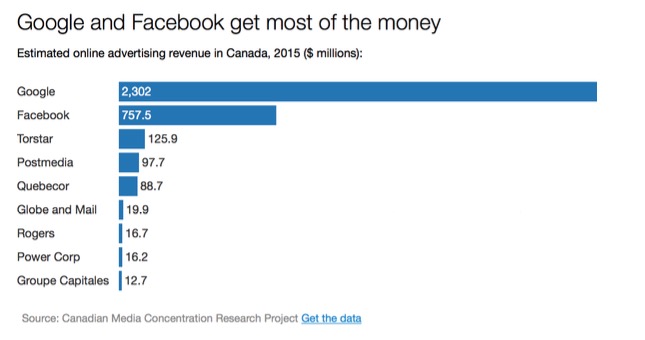
Canadian journalism is in crisis. While the news business north of the border faces many of the same structural challenges as the American industry — shrinking print circulation, an online ad market dominated by Facebook and Google, etc. — Canada’s size (slightly smaller than California) and highly centralized media ownership has allowed little room for digital upstarts.
An estimated one-third of Canadian journalism jobs have been lost since 2010, according to a new report out Thursday written by Edward Greenspon, a former editor-in-chief of The Globe and Mail and now CEO of Canada’s Public Policy Forum. (Just this week, Postmedia announced that it was cutting 15 jobs at the Montreal Gazette and Ottawa Citizen, for instance. The chain, Canada’s largest, has cut more than 3,000 jobs over the past six years.)


The report, titled “The Shattered Mirror” — a play on a 1970 report on Canadian media called “The Uncertain Mirror” — lays out the issues facing the Canadian news business and offers 12 recommendations for how to ensure a sustainable future for journalism in that country.
The first five recommendations call on the Canadian government to change several elements of the tax code, tighten copyright law to limit uncompensated aggregation, and create and fund an independent Future of Journalism & Democracy Fund that will support local and indigenous digital news startups while also funding research on news’ role in society. Greenspon envisions that the fund could function something like the Knight Foundation in the United States or Google’s European Digital News Initiative. The report proposes an initial investment of $100 million from the government to support the fund.Under Canada’s Income Tax Act, the cost of advertising in Canadian-owned, operated, and published news outlets is tax deductible for the advertiser. The law, passed in 1976, was meant to encourage businesses to advertise on Canadian TV stations, not American broadcasters that could reach audiences across the border.
However, as it’s written now, the preference for Canadian media only applies to traditional television and newspapers. In 1996, the government issued a rule that stated that all online ads were tax deductible, no matter the site’s country of origin.
“The current situation is neither fair nor sensible: A Canadian advertiser cannot deduct expenses when buying space in The New York Times but can when placing an ad on nyt.com,” Greenspon writes. “Similarly, expenses for advertising on a border TV station cannot be deducted but can be if on YouTube.”The report estimates that this change to the tax code to eliminate this deduction would result in additional income of $300 million to $400 million Canadian annually (roughly $230 million to $305 million U.S.) that could be used to fund the proposed Journalism & Democracy Fund.
Another proposed change to the tax code is to exempt advertising and subscription revenue at Canadian-owned outlets from sales tax. Greenspon estimates that this would cost the Canadian government $40 to $50 million Canadian annually ($23 million to $31 million U.S.), but at least part of that could be recouped by collecting sales tax on subscriptions and advertising for foreign outlets that are currently exempt from the tax.
Notably, this proposal would apply to Facebook and Google advertising. The European Union, New Zealand, and Israel have all enacted similar proposals in recent years.
“By and large, they have shifted taxation on digital goods from the locale of the company to the location of the customer,” the report says. “The large companies have not resisted. ‘Facebook pays taxes according to the law in every country it operates, including Israel,’ the social media company said when Israel reformed its value-added tax law last spring. Google has commented similarly.”
With all these proposals for ways for the government to create a more hospitable environment for news organizations, Greenspon emphasizes that editorial independence is paramount.
Of course, the very thing that makes news special also makes it a delicate subject for public policy. Journalism must maintain its independence from governments large and small, which creates a conundrum that distresses Canadians: how to help something that is increasingly less able to do its job while keeping it free from official influence. What’s more, any measures to confront fake or counterfeit news must be supremely careful not to risk controlling speech in ways that are not, as the Charter of Rights and Freedoms dictates, “demonstrably justified in a free and democratic society.
Beyond government actions, the other proposals include the establishment of an organization to offer legal advice to smaller outlets, improve coverage of indigenous affairs, and encourage the Canadian Press, the country’s wire service, to expand its coverage of underserved local public affairs.
The final recommendations, however, all focus on the Canadian Broadcasting Corporation in an attempt to put “greater emphasis on the news and information aspects of CBC operations to address the serious decline in original civic-function news.”
The report calls on the CBC to stop selling digital advertising. This move, the report argues, would encourage the broadcaster to publish more public-service journalism online and not chase cheap clicks to boost ad revenue. The move would cost the CBC $25 million Canadian, and Greenspon proposes an increase in the broadcaster’s appropriation from the government to offset the loss.
“Our call for CBC to vacate the digital ad space has less to do with who may inherit the $25 million in forgone revenue (little will go to newspaper publishers) than with freeing CBC from the traffic-maximizing, clickbait mentality that devalues serious journalism. The CBC, especially now, must favour quality over quantity,” the report says.
Finally, the report encourages the CBC to publish all its coverage under a Creative Commons license in order to allow other news organizations to publish its reporting for no cost.
“The best defence to fake news is a strong offence, widely disseminating real news produced to the highest standards. Sharing the CBC’s content in this manner would see significantly more quality journalism coursing through the social media ecosystem,” the report says.
The full report, with more information on the proposals and a deeper overview of the Canadian media landscape is available here.